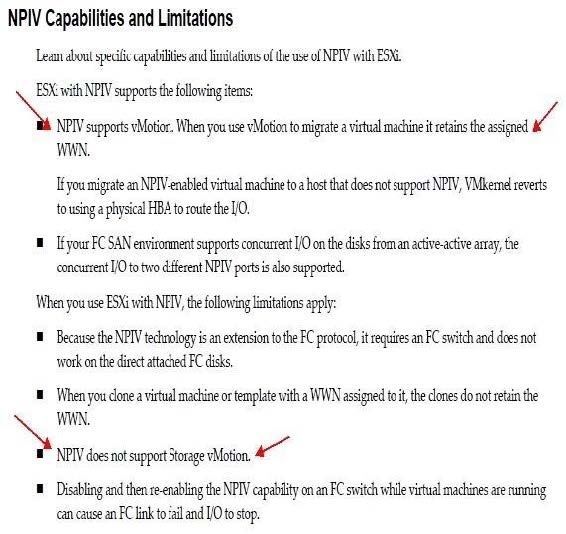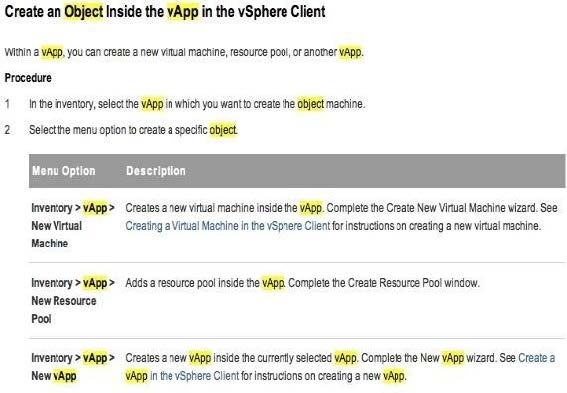Exam Details
Exam Code
:VCP5-DCVExam Name
:VMware Certified Professional 5 - Data Center Virtualization (VCP5-DCV)Certification
:VMware CertificationsVendor
:VMwareTotal Questions
:571 Q&AsLast Updated
:Dec 21, 2024
VMware VMware Certifications VCP5-DCV Questions & Answers
-
Question 371:
What tool can an administrator use to determine if an existing environment is ready for Fault Tolerance?
A. Fault Tolerance Map
B. VMware SiteSurvey Tool
C. VMware Cluster Analyzer
D. VMware Capacity Planner
-
Question 372:
A mid-size company with a vSphere 5 cluster wants to enable their helpdesk staff to be able to acknowledge alarms on the hosts. Currently the group "HelpDesk" has the Read-only role assigned to the Cluster object. Which action should the administrator perform?
A. Enable Propagate to Child Objects on the current permission.
B. Move the current permission to the Datacenter object.
C. Add the Alarms - Acknowledge Alarm privilege to the current role and enable "Propagate to Child Objects"
D. Clone the role, add the Alarms - Acknowledge Alarm privilege, replace the current role.
-
Question 373:
An administrator finds that vMotion and Storage vMotion operations do not succeed on a virtual machine. The virtual machine has been configured with N_Port ID Virtualization. The virtual machine has two data RDMs, one using a RAID5 LUN and one using a RAID0+1 LUN. The mapping file for the RAID5 LUN was created on the same datastore as the virtual machine, and the mapping file for the RAID0+1 LUN was placed in a datastore used for production data virtual disks.
Which two statements are true about this configuration? (Choose two.)
A. Storage vMotion cannot be used unless both mapping files are placed on the same datastore.
B. vMotion cannot be used unless both mapping files are placed on the same datastore.
C. vMotion cannot be used with RDMs.
D. Storage vMotion cannot be used with NPIV.
-
Question 374:
What are three true statements about quiescing virtual machine snapshots? (Choose three.)
A. vSphere snapshot quiescing only occurs on Windows guest OSes.
B. The quiescing operation is automatic with any snapshot.
C. The quiescing operation varies by guest OS.
D. Quiescing should occur before array-based snapshots to ensure consistency.
E. VMware Tools is required for quiescing to be successful.
-
Question 375:
An administrator takes a vSphere snapshot of a virtual machine and applies an OS update. After confirming the update the administrator cannot enable Fault Tolerance on the virtual machine and suspects there are snapshots that have not been consolidated. Which two operations can the administrator perform to verify consolidation is needed? (Choose two.)
A. Expose the Needs Consolidation column in the virtual machines tab of the host.
B. Browse the datastore containing the vmdk files and look for files with the "-delta.vmdk" extension.
C. Expose the Needs Consolidation column in the virtual machine summary tab.
D. Select and run the vSphere Cluster HealthCheck from the right-click menu of the cluster object.
-
Question 376:
Which two conditions must exist on all hosts in the cluster if Enhanced vMotion Compatibility (EVC) is used? (Choose two.)
A. The cluster must be enabled for DRS.
B. All hosts in the cluster must be running ESX/ESXi 3.5 Update 2 or later.
C. All hosts in the cluster must have hardware virtualization support enabled.
D. The cluster must be enabled for HA.
-
Question 377:
An administrator is enabling Enhanced vMotion Compatibility (EVC) in a DRS cluster. The administrator wants only hosts with the newest Intel processors added to the cluster. Which setting satisfies this requirement?
A. The baseline with the most CPUs listed
B. The baseline with the fewest CPUs listed
C. Any baseline that contains Future Intel processors
D. Create a new baseline and add only the latest processor family
-
Question 378:
An administrator has just finished deploying a vApp for a web service. What three options are available to the administrator for IP allocation within the vApp? (Choose three.)
A. Transient
B. Fixed
C. DHCP
D. Bridged
E. NAT
-
Question 379:
Which two conditions prevent the application of a host profile to an ESXi 5.x host? (Choose two.)
A. The host has multiple profiles attached.
B. The host has not been placed into maintenance mode.
C. The host is running virtual machines.
D. The host is an ESXi host.
-
Question 380:
What are three valid objects to place in a vApp? (Choose three.)
A. Folders
B. Hosts
C. Resource pools
D. vApps
E. Virtual machines
Related Exams:
1V0-21.20
Associate VMware Data Center Virtualization1V0-31.21
Associate VMware Cloud Management and Automation1V0-41.20
Associate VMware Network Virtualization1V0-61.21
Associate VMware Digital Workspace1V0-71.21
Associate VMware Application Modernization1V0-81.20
Associate VMware Security2V0-21.20
Professional VMware vSphere 7.x2V0-21.23
VMware vSphere 8.x Professional2V0-31.21
Professional VMware vRealize Automation 8.32V0-31.23
VMware Aria Automation 8.10 Professional
Tips on How to Prepare for the Exams
Nowadays, the certification exams become more and more important and required by more and more enterprises when applying for a job. But how to prepare for the exam effectively? How to prepare for the exam in a short time with less efforts? How to get a ideal result and how to find the most reliable resources? Here on Vcedump.com, you will find all the answers. Vcedump.com provide not only VMware exam questions, answers and explanations but also complete assistance on your exam preparation and certification application. If you are confused on your VCP5-DCV exam preparations and VMware certification application, do not hesitate to visit our Vcedump.com to find your solutions here.


